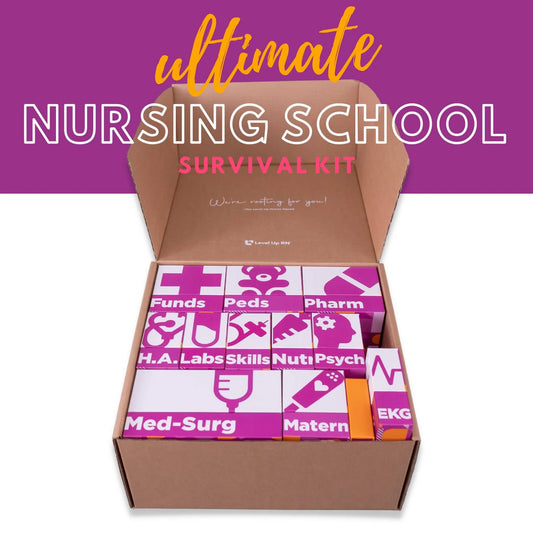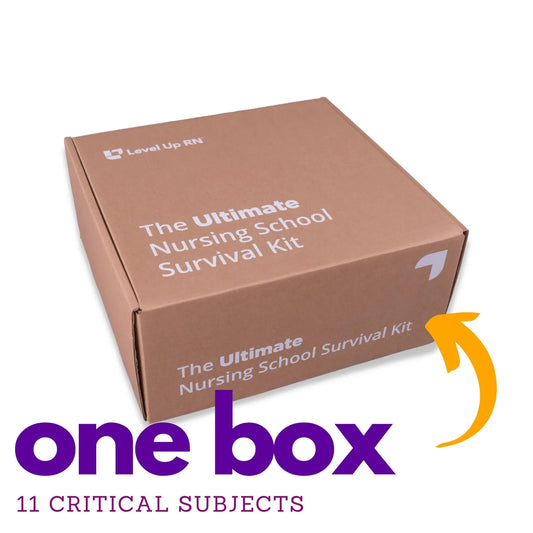Nursing Tips
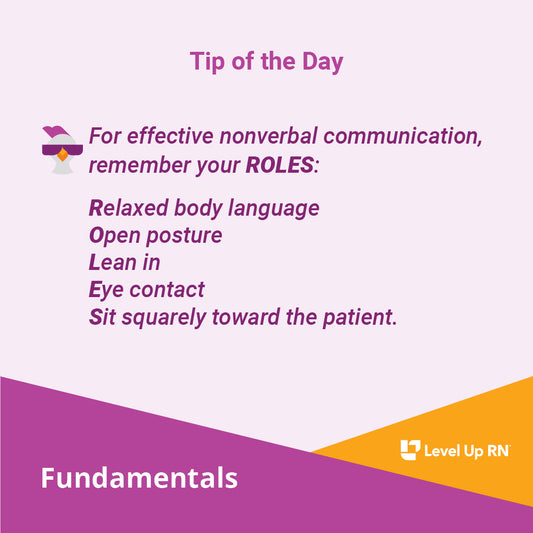
Effective Nonverbal Communication
For effective nonverbal communication, remember your ROLES: Relaxed body language, Open posture, Lean in, Eye contact, Sit squarely toward the patient.
Effective Nonverbal Communication
For effective nonverbal communication, remember your ROLES: Relaxed body language, Open posture, Lean in, Eye contact, Sit squarely toward the patient.
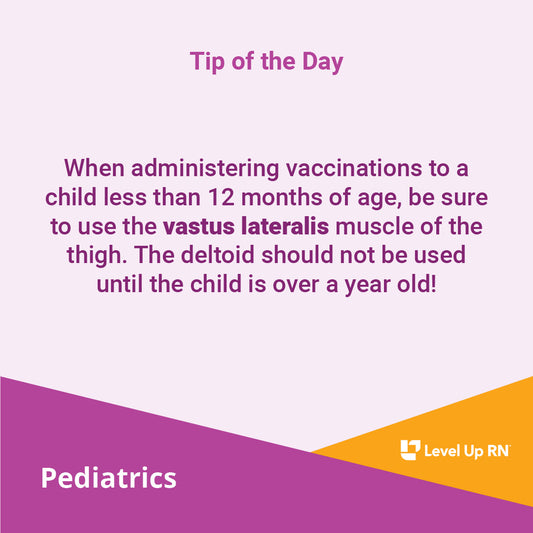
Pediatric Vaccine Administration
When administering vaccinations to a child less than 12 months of age, be sure to use the vastus lateralis muscle of the thigh. The deltoid should not be used until...
Pediatric Vaccine Administration
When administering vaccinations to a child less than 12 months of age, be sure to use the vastus lateralis muscle of the thigh. The deltoid should not be used until...

Lithotomy Position
Lithotomy position has the patient supine with their knees flexed and legs abducted. This position is commonly used for gynecologic, rectal, or urologic procedures.
Lithotomy Position
Lithotomy position has the patient supine with their knees flexed and legs abducted. This position is commonly used for gynecologic, rectal, or urologic procedures.

Supine Position
A patient who is lying "supine" is lying on their back in a neutral position.
Supine Position
A patient who is lying "supine" is lying on their back in a neutral position.
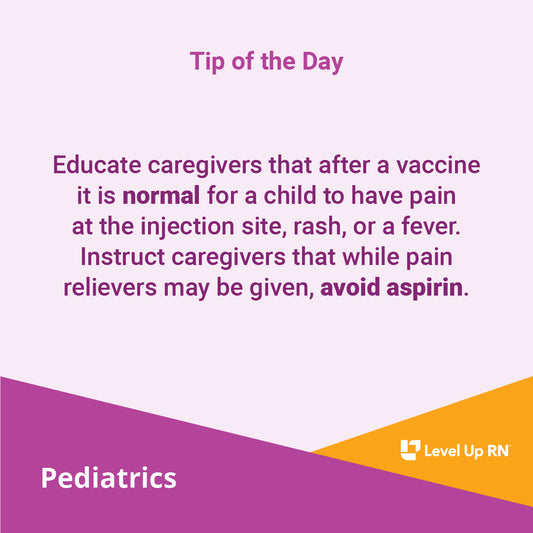
Post-vaccine Care for Children
Educate caregivers that after a vaccine it is normal for a child to have pain at the injection site, rash, or a fever. Instruct caregivers that while pain relievers may...
Post-vaccine Care for Children
Educate caregivers that after a vaccine it is normal for a child to have pain at the injection site, rash, or a fever. Instruct caregivers that while pain relievers may...

Orthodox Jewish diet
Orthodox jewish individuals do not eat meat WITH dairy, pork products, or shellfish. A hamburger is OK, but not a cheeseburger!
Orthodox Jewish diet
Orthodox jewish individuals do not eat meat WITH dairy, pork products, or shellfish. A hamburger is OK, but not a cheeseburger!
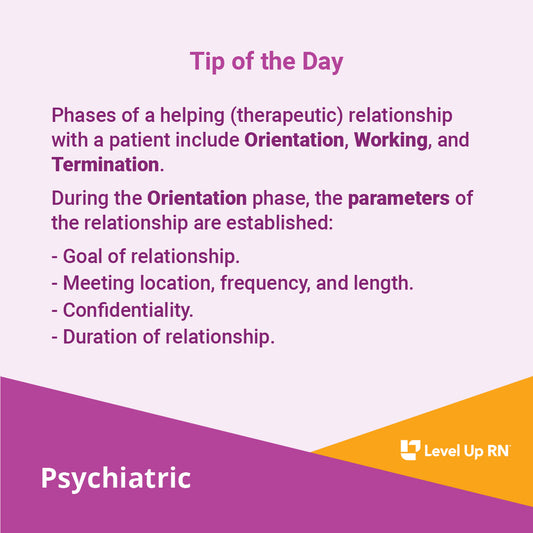
Phases of Helping Relationships
Phases of a helping (therapeutic) relationship with a patient include Orientation, Working, and Termination.
Phases of Helping Relationships
Phases of a helping (therapeutic) relationship with a patient include Orientation, Working, and Termination.
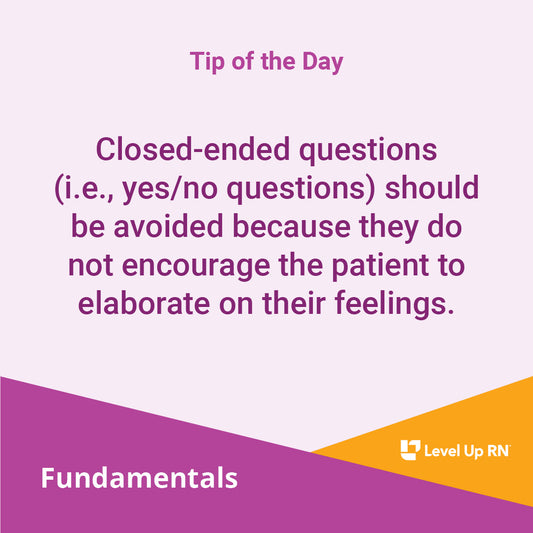
Closed-Ended Questions
Closed-ended questions (i.e., yes/no questions) should be avoided because they do not encourage the patient to elaborate on their feelings.
Closed-Ended Questions
Closed-ended questions (i.e., yes/no questions) should be avoided because they do not encourage the patient to elaborate on their feelings.

Corrections to Documentation
If the nurse should make an error while documenting on a written error, cross out the error with one line and add initials, date, and time. Do not use correction...
Corrections to Documentation
If the nurse should make an error while documenting on a written error, cross out the error with one line and add initials, date, and time. Do not use correction...

Family Systems Theory
Family systems theory states that the family is an interdependent unit. Any change or stressor experienced by one family member affects the entire family.
Family Systems Theory
Family systems theory states that the family is an interdependent unit. Any change or stressor experienced by one family member affects the entire family.
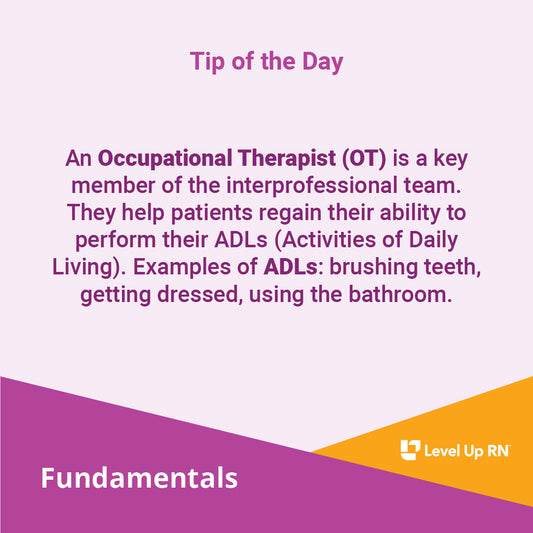
OTs and ADLs
An Occupational Therapist (OT) is a key member of the interprofessional team. They help patients regain their ability to perform their ADLs (Activities of Daily Living). Examples of ADLs: brushing...
OTs and ADLs
An Occupational Therapist (OT) is a key member of the interprofessional team. They help patients regain their ability to perform their ADLs (Activities of Daily Living). Examples of ADLs: brushing...

Ethics Committee
An ethics committee is an interdisciplinary team that may be used to provide guidance in the face of an ethical dilemma.
Ethics Committee
An ethics committee is an interdisciplinary team that may be used to provide guidance in the face of an ethical dilemma.

Canes: Patient Teaching
Educate patients that canes should be held on the strong side with the handle at the level of the wrist.
Canes: Patient Teaching
Educate patients that canes should be held on the strong side with the handle at the level of the wrist.
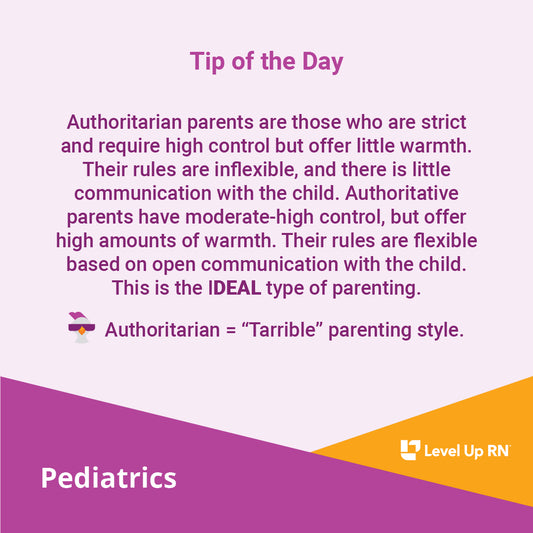
Authoritarian vs. Authoritative Parenting
Authoritarian parents are those who are strict and require high control but offer little warmth. Authoritative parents have moderate-high control, but offer high amounts of warmth.
Authoritarian vs. Authoritative Parenting
Authoritarian parents are those who are strict and require high control but offer little warmth. Authoritative parents have moderate-high control, but offer high amounts of warmth.

Providing Educational Materials to Patients
Written educational materials should be provided in the patient's primary language using layman's terms and an appropriate reading level.
Providing Educational Materials to Patients
Written educational materials should be provided in the patient's primary language using layman's terms and an appropriate reading level.
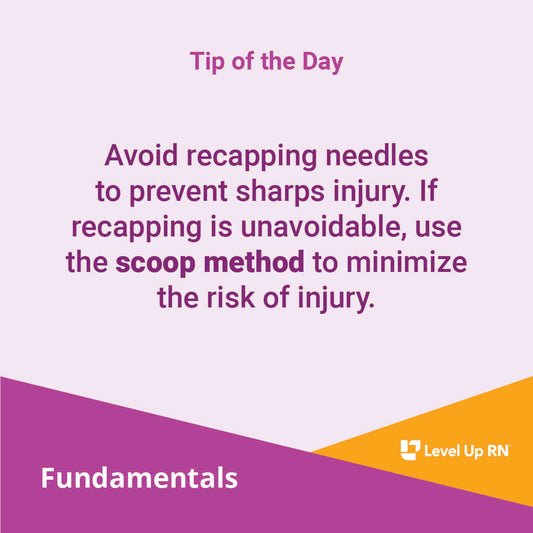
The Scoop Method
Avoid recapping needles to prevent sharps injury. If recapping is unavoidable, use the scoop method to minimize the risk of injury.
The Scoop Method
Avoid recapping needles to prevent sharps injury. If recapping is unavoidable, use the scoop method to minimize the risk of injury.
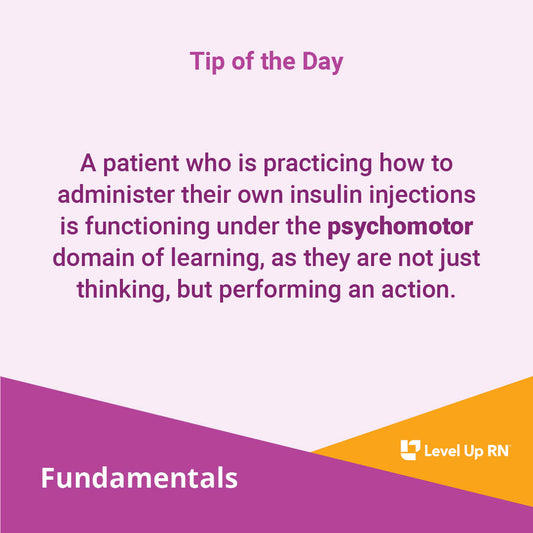
Psychomotor Domain of Learning
A patient who is practicing how to administer their own insulin injections is functioning under the psychomotor domain of learning, as they are not just thinking, but performing an action.
Psychomotor Domain of Learning
A patient who is practicing how to administer their own insulin injections is functioning under the psychomotor domain of learning, as they are not just thinking, but performing an action.
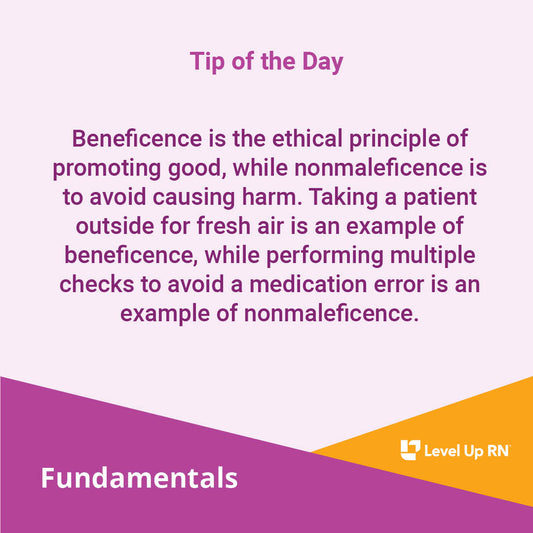
Beneficence vs. Nonmaleficence
Beneficence is the ethical principle of promoting good, while nonmaleficence is to avoid causing harm.
Beneficence vs. Nonmaleficence
Beneficence is the ethical principle of promoting good, while nonmaleficence is to avoid causing harm.

Nursing Interventions for the Restrained Patient
The timing of nursing interventions for the restrained patient is crucial! 1) Assess the patient's status every 15 minutes. 2) Offer fluids, ROM exercises, and toileting every 2 hours. 3)...
Nursing Interventions for the Restrained Patient
The timing of nursing interventions for the restrained patient is crucial! 1) Assess the patient's status every 15 minutes. 2) Offer fluids, ROM exercises, and toileting every 2 hours. 3)...

Sublimation
Sublimation is marked by an individual transforming unacceptable impulses into socially acceptable behaviors.
Sublimation
Sublimation is marked by an individual transforming unacceptable impulses into socially acceptable behaviors.
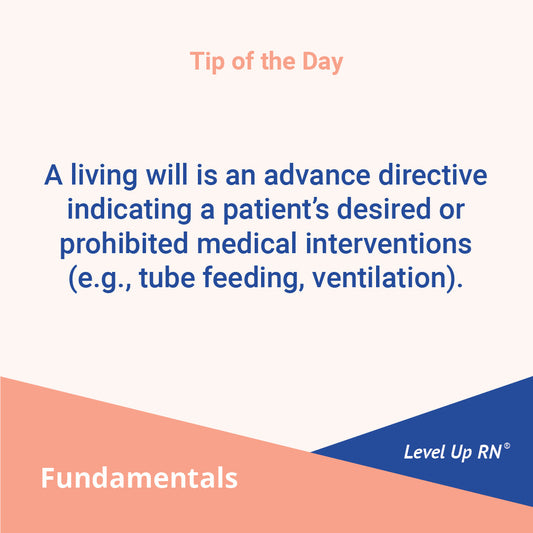
What is a Living Will?
A living will is an advance directive indicating a patient's desired or prohibited medical interventions (e.g., tube feeding, ventilation).
What is a Living Will?
A living will is an advance directive indicating a patient's desired or prohibited medical interventions (e.g., tube feeding, ventilation).
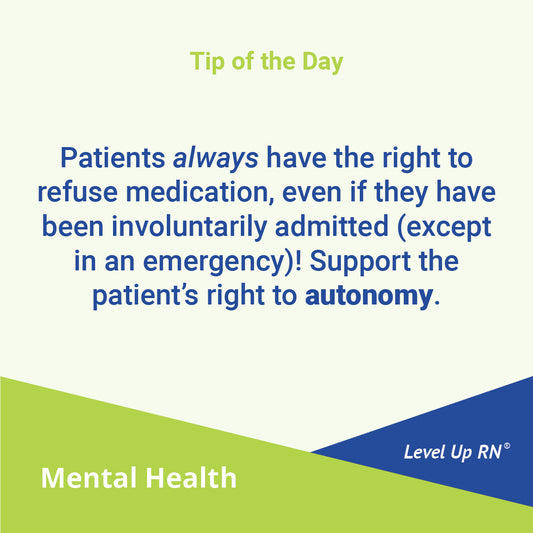
Right to Refuse Medication
Patients always have the right to refuse medication, even if they have been involuntarily admitted (except in an emergency)! Support the patient's right to autonomy.
Right to Refuse Medication
Patients always have the right to refuse medication, even if they have been involuntarily admitted (except in an emergency)! Support the patient's right to autonomy.
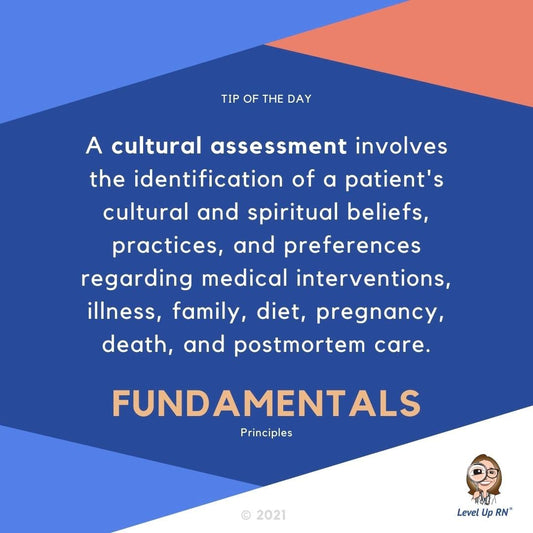
Cultural Assessment
A cultural assessment involves the identification of a patient's cultural and spiritual beliefs, practices, and preferences regarding medical interventions, illness, family, diet, pregnancy, death, and postmortem care.
Cultural Assessment
A cultural assessment involves the identification of a patient's cultural and spiritual beliefs, practices, and preferences regarding medical interventions, illness, family, diet, pregnancy, death, and postmortem care.

Complicated Grief
Complicated grief is that which lasts longer than a year and interferes with the individual's daily functioning.
Complicated Grief
Complicated grief is that which lasts longer than a year and interferes with the individual's daily functioning.

High-Fowler's Position
A High-Fowler's position involves the patient sitting with the head of the bed at 60 - 90°. This is the ideal position to help with difficulty breathing.
High-Fowler's Position
A High-Fowler's position involves the patient sitting with the head of the bed at 60 - 90°. This is the ideal position to help with difficulty breathing.

Bipolar Disorders: I and II
Bipolar I Disorder is characterized by episodes of severe mania and depression. Bipolar II Disorder is marked by episodes of hypomania (less severe than true mania) and depression.
Bipolar Disorders: I and II
Bipolar I Disorder is characterized by episodes of severe mania and depression. Bipolar II Disorder is marked by episodes of hypomania (less severe than true mania) and depression.
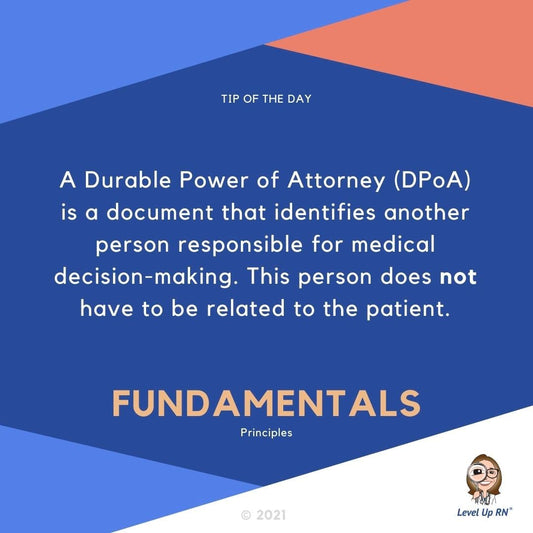
Durable Power of Attorney (DPoA)
A Durable Power of Attorney (DPoA) is a document that identifies another person responsible for medical decision-making. This person does not have to be related to the patient.
Durable Power of Attorney (DPoA)
A Durable Power of Attorney (DPoA) is a document that identifies another person responsible for medical decision-making. This person does not have to be related to the patient.
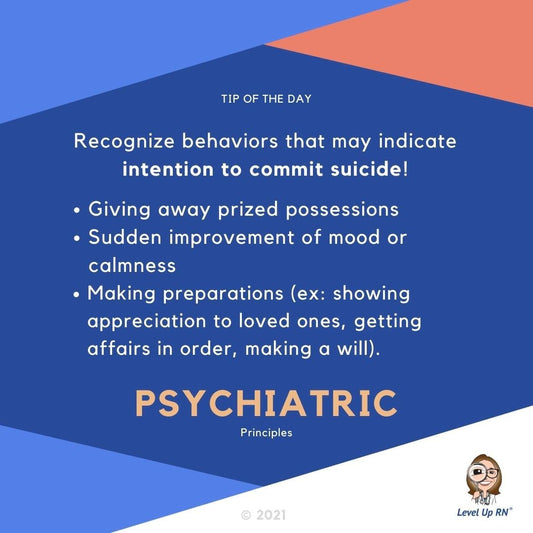
Indications of Intent to Commit Suicide
Recognize behaviors that may indicate an intention to commit suicide . For example: Giving away prized possessions, sudden improvement of mood or calmness, and/or making of final preparations.
Indications of Intent to Commit Suicide
Recognize behaviors that may indicate an intention to commit suicide . For example: Giving away prized possessions, sudden improvement of mood or calmness, and/or making of final preparations.
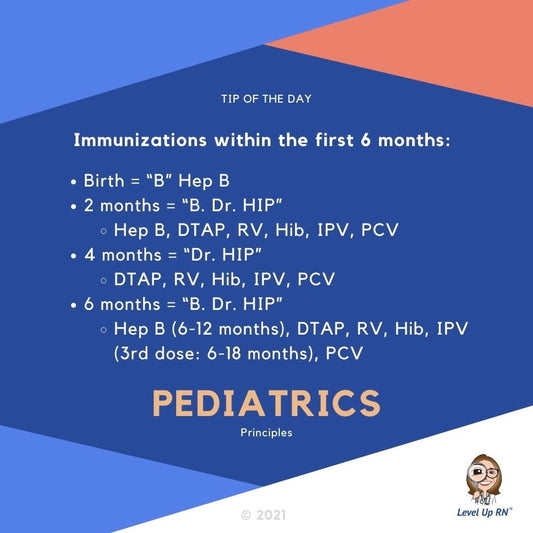
Immunizations in first 6 months
IMMUNIZATIONS IN FIRST 6 MONTHS Birth = "B" Hep B 2 Months = "B. Dr. HIP" Hep B, DTAP, RV, Hib, IPV, PCV 4 months = "Dr. HIP" DTAP, RV,...
Immunizations in first 6 months
IMMUNIZATIONS IN FIRST 6 MONTHS Birth = "B" Hep B 2 Months = "B. Dr. HIP" Hep B, DTAP, RV, Hib, IPV, PCV 4 months = "Dr. HIP" DTAP, RV,...
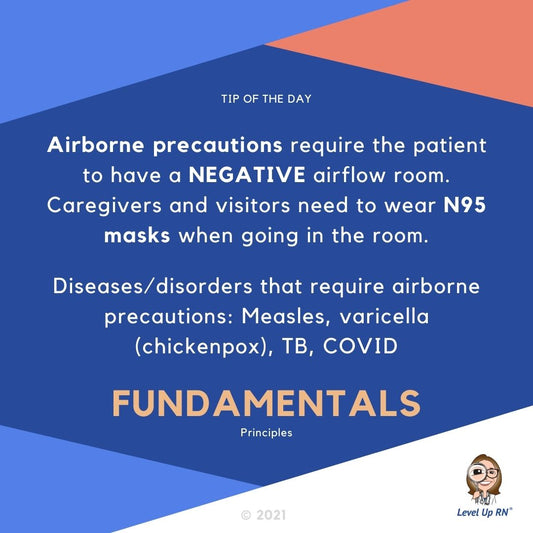
Airborne Precautions
Airborne precautions require the patient to have a NEGATIVE airflow room. Caregivers and visitors need to wear N95 masks when going in the room.
Airborne Precautions
Airborne precautions require the patient to have a NEGATIVE airflow room. Caregivers and visitors need to wear N95 masks when going in the room.
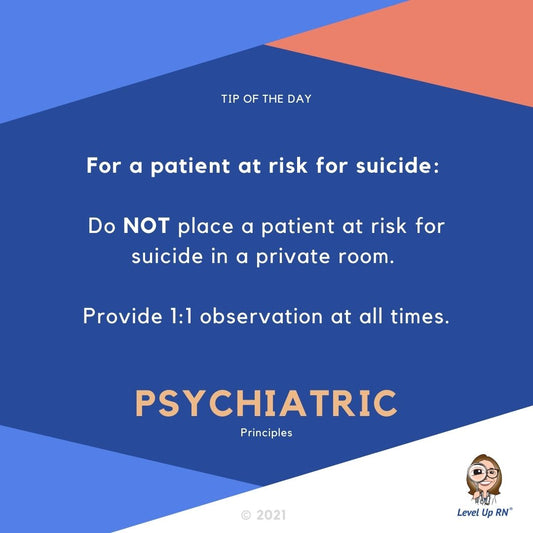
Patient at risk for suicide
For a patient at risk for suicide: Do NOT place a patient at risk for suicide in a private room. Provide 1:1 observation at all times.
Patient at risk for suicide
For a patient at risk for suicide: Do NOT place a patient at risk for suicide in a private room. Provide 1:1 observation at all times.
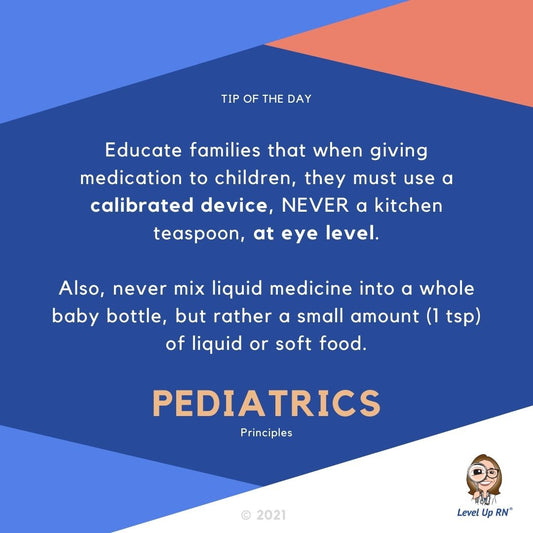
Giving Medication to Children
Educate families that when giving medication to children, they must use a calibrated device
Giving Medication to Children
Educate families that when giving medication to children, they must use a calibrated device
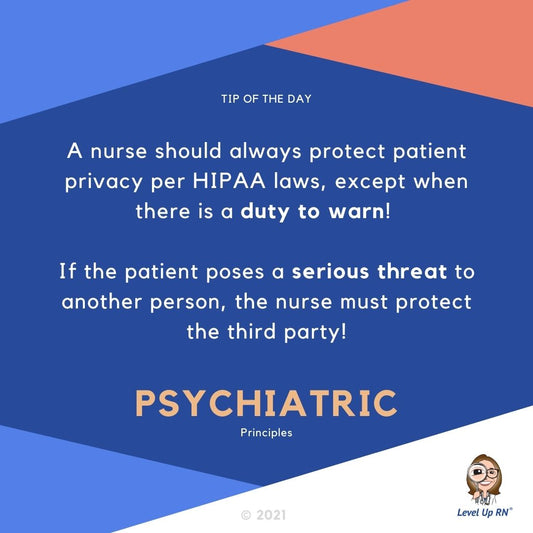
Duty to Warn
A nurse should always protect patient privacy per HIPAA laws, except when there is a duty to warn!
Duty to Warn
A nurse should always protect patient privacy per HIPAA laws, except when there is a duty to warn!
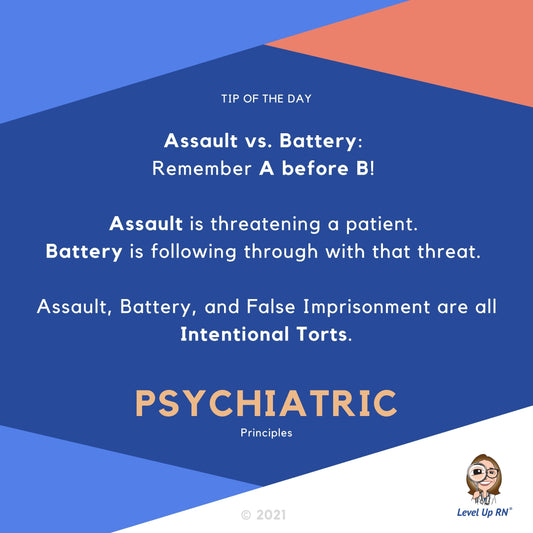
Assault versus Battery
Assault vs. Battery Remember A before B! Assault is threatening a patient, Battery is following through with that threat.
Assault versus Battery
Assault vs. Battery Remember A before B! Assault is threatening a patient, Battery is following through with that threat.
Filter Articles
Shop
The Ultimate Nursing School Survival Kit - Flashcards
4.869565217 / 5.0
(230) 230 total reviews
Regular price $349.95Regular priceUnit price / per$469.95Sale price $349.95SaleVideos by Subject
Tips & More
Exam Information
Subscribe


